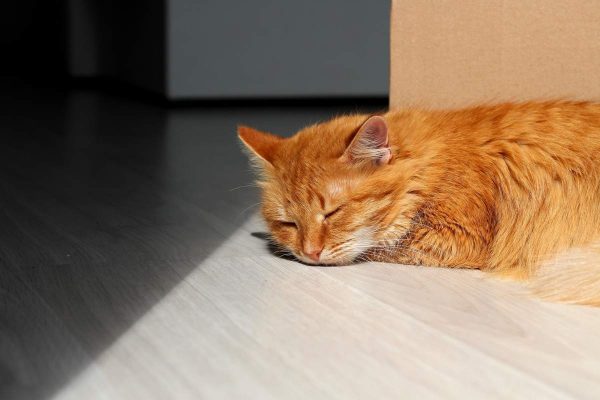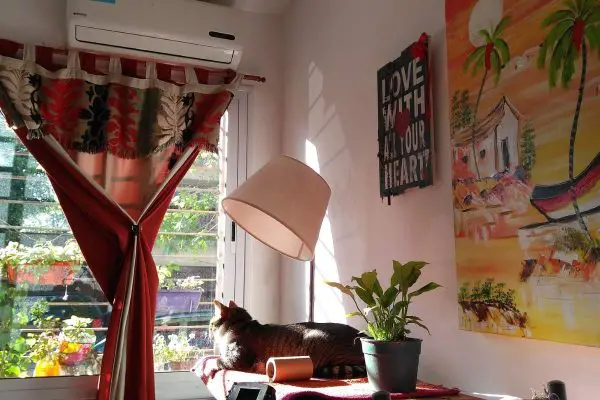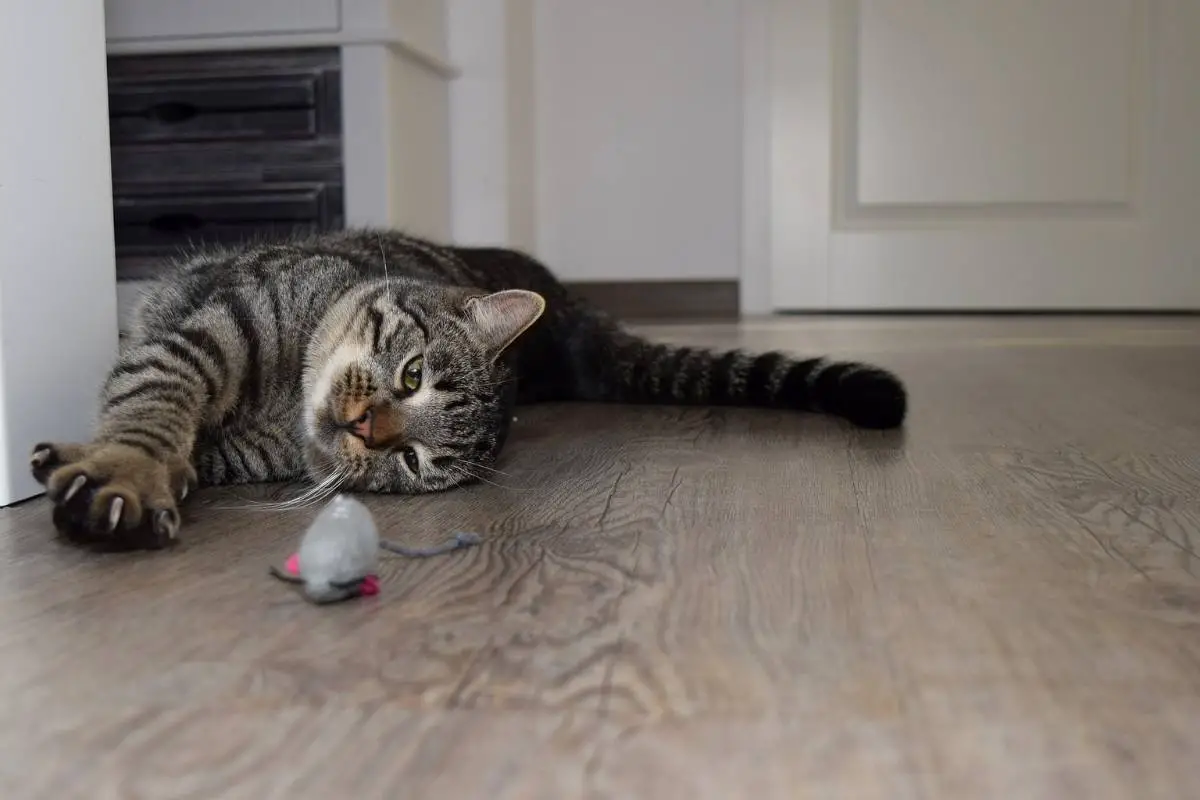When you are sitting down and resting, or getting ready to fall asleep at night, you may notice that your cat is not interested in doing the same. Watching your cat walking back and forth, into your room and back out again, can be concerning and occasionally troublesome.
Your cat keeps coming in and out of my room because your cat is exploring—checking out where you are, then making sure all the other rooms in the house are in order. Cats are naturally very curious, as the saying goes…
However, if this ‘wandering’ is accompanied by other strange behaviors, there could be cause for concern. Pain, confusion, anxiety, or other illness could prompt your cat’s restlessness.
Cats Being Cats

Cats, by their nature, are territorial creatures. You may have noticed stray cats outside marking buildings or trees, or your own cat doing similar things in your house or the yard. Cats will make rounds, exploring what they consider to be ‘theirs’, making sure that everything is in its place, and that there is no obvious sign of danger or disturbance.
Your cat, when they come into your room, wander around, and then leave, is merely keeping you safe. You may not think that their vigilance is necessary, but as far as they’re concerned, this is their job as the cat of the house, and they have to make sure that their home and their surrounding environment is as it should be.
How to Change This Behavior
There really isn’t much you can do to make your cat less of a cat. Some breeds of cat are more inclined to demonstrate this behavior than others, but all cats will do this to some extent. You can make things feel safer for your cat by limiting the redecorating you do in your house, so that your cat isn’t caught off guard by these changes and feels more at home.
This, combined with regular play and exercise, can help them settle sooner, and help you feel more at ease.
If your cat demands more space to roam, and likes to do his rounds in the neighborhood or your yard, be sure to spay or neuter your pet to prevent unwanted kittens, and make sure your cat wears an ID collar with a bell, to keep your furry friend from getting lost or killing wildlife.
Alternatively, if your cat comes into your room and causes some kind of disturbance, like knocking something over or meowing, your pet might be bored, or need something from you. Try taking five minutes to play with your cat and see if that helps them settle.
If this doesn’t seem to help, try following your cat to wherever it is that they’re going: they might need food, or help with something. Once you give them a little attention, your cat may be more willing to leave you alone.
Other Causes of Wandering
In Kittens and Young Cats

Kittens are undeniably adorable, but they do have some habits that can be troublesome. After a long day of running around and playing, you may be ready to sit down and rest, but your kitten is still ready to go, even late at night.
Listening to them hopping around and wrestling with the nearest toy can prevent a restful sleep on your part, but eventually your kitten will settle and sleep, if only for a short time. Just like children, kittens need lots of attention and play, but as your kitten matures, this constant need for play will also lessen, and both you and your cat will start to sleep more.
However, in very new kittens, particularly recently purchased ones, you may notice them wandering and crying instead of playing. Sadly, they may be looking for their littermates, as they have spent their whole life in their company up to this point.
It can be heartbreaking to see your new kitten so miserable. However, you can help make them less lonely by making sure they have a comfortable new home, lots of cuddles, and an abundance of toys to help distract them. Soon, with attention and care, both you and your new kitten will be much happier.
Hormones
If your cat’s restless behavior is a new development, there might be some other cause for it. If your cat is younger and not ‘fixed’, your cat’s wandering may be indicative of them being in heat and looking for a mate. If your cat is yowling more than usual, its likely it’s in heat, or near another cat that’s in heat.
It’s always a good idea to spay or neuter your pets to make sure they don’t make any unwanted kittens at the neighbor’s house, and to prevent them from being uncomfortable due to their hormones.
Spaying or neutering your pet is a simple surgery with a short recovery and is a service that is provided by any veterinary hospital. Fixing your pet has no negative effects on your pet’s health, and often makes their lives much easier in the long term.
Discomfort
Another cause for wandering could be discomfort. If your cat comes into your room, lies down for a time, and then gets back up and walks away, they could be in some sort of pain. Cats, like humans, have allergies and sensitive stomachs.
If you notice your cat retching or vomiting, limping or favoring a side, or notice a new-found disinterest in food, be sure to take your pet to the vet for a professional examination to make sure that their restlessness is not caused by your cat being in pain.
Hyperthyroidism
The thyroid is a gland in the throat that, in part, manages your cat’s metabolism. Occasionally in middle-aged or elderly cats an enlarged thyroid will produce more hormones than necessary, leading to a disease called ‘thyrotoxicosis’ or hyperthyroidism.
Because of this disease, your cat may experience increased hunger, increased thirst, agitation, and high blood pressure, among other symptoms. If you have noticed these signs in addition to your cat spending more time wandering around, particularly at night, your pet may have hyperthyroidism.
Fortunately, hyperthyroidism is not always difficult to treat. Sometimes it can be something as simple as a change of diet; other times, more drastic measures like surgery must be taken. A trip to the vet and an examination will tell you whether or not your cat is suffering from hyperthyroidism, and what treatment will be best for them.
Specific to Elderly Cats

As cats age, they will experience cognitive changes, just like many humans will. You may notice that your older cat has begun pacing around the room, meowing at night, or has developed other ‘bad’ habits such as:
- Forgetting to use the litterbox
- Getting ‘lost’ in the house
- Getting ‘stuck’ in familiar areas
- Becoming either extremely clingy or more aloof
- Apathy or disinterest in old activities
- Irritability or agitation
Any or all of these can be indicative of age-related cognitive decline in your cat, but a vet will have to perform an examination before this can be confirmed.
What to Do
Before dismissing it as ‘just getting old’, remember that there are steps you can take to make sure that your pet’s golden years are as comfortable and as happy as possible. Starting your cat on an anti-inflammatory medicine could help with arthritis pain and help increase your cat’s mobility.
Adding extra litterboxes to the house can help your cat remember to use them, and making sure that your cat has a stable ‘routine’ can help reduce their anxiety and pacing behaviors. Your vet will be able to help you decide what is the best course of action for your cat.
Conclusion
Some pet owners find themselves asking, ‘Why is my cat always in my room?’ Your cat may wander in and out of your room for various reasons, most likely related to their territorial nature.
Unless there are other signs of boredom, confusion, or discomfort, it is safe to assume that your cat is merely patrolling the house, checking in on you occasionally before moving on to examine the rest of their domain.
In younger cats, they may be restless and ready to play some more, even after an entire day of activity; in more mature cats it could be a result of raging hormones, general boredom, or a desire to get you to pay attention to them. In elderly cats, it could be indicative of cognitive dysfunction or thyroid imbalance, both things that can be adjusted for and treated.
Regardless, if your cat’s behavior is concerning, or you have noticed any signs of pain or illness such as limping or gagging, it’s best to contact your vet for a more in-depth examination of your pet to make sure that your cat is healthy and comfortable.
Otherwise, you can rest assured that your cat’s behavior is normal, and, if it’s bothersome, can be compensated for with a regular routine and a quiet, stable home.
Sources:
- https://www.vet.cornell.edu/departments-centers-and-institutes/cornell-feline-health-center/health-information/feline-health-topics/hyperthyroidism-cats
- https://www.cathealth.com/behavior/how-and-why/2485-my-cat-is-pacing-all-night-what-s-up
- https://www.petplan.co.uk/pet-information/cat/advice/roaming/
- https://www.aspca.org/pet-care/cat-care/common-cat-behavior-issues/older-cats-behavior-problems

